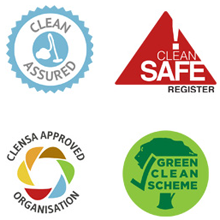
Is your tenancy coming to an end?
Has the time come for you to move out of your rented property?
Get prepared to safely check out, for your tenancy deposit could end up as a subject of disputes, claims and deductions on behalf of your landlord. Unexpected repairs, agreement requirements or rough management.
In this article, you find a set of practical tenant tips to help you get your tenancy deposit refund back 100% guaranteed. Learn how to reduce deductions as low as possible.
Look at the Bible / Your Tenancy Agreement FIRST!
No, we don’t literally refer to the Bible, but when it comes to landlords and tenants, your tenancy agreement is the one document that stands out the most in terms of chores and responsibilities.
Your tenancy agreement is the single written proof of terms and conditions which you and your landlord are bound to follow. It should state how and when the tenancy should end, how your housing deposit should be deducted or fully refunded, and any other explicit chores and responsibilities you must comply with as a tenant.
It is the sole document serving as a ground for legal disputes and of course – final decisions.
Depending on your tenancy agreement type and contents, tenants might be held liable for:
- Ensuring a professional end-of-tenancy cleaning service, prior to moving out;
- Tidy shared property areas and inventory (if mentioned explicitly);
- Take care of basic landscaping, garden maintenance or repairs;
- Repainting the rental property interior back to its initial condition, if you were previously allowed to renovate;
- Rearranging inventory like furnishing, carpets and etc, back to its original position;
- Held eligible for the cost of steam and dry chem of rugs if the condition is poor.
Regardless of how bad or good your tenant-landlord relationship is, your tenancy agreement is the one single document you should take into absolute consideration. It highlights the dos and don’ts both sides should follow.
How come property inventory reports are crucial to ending your tenancy right?
A third-party property inventory report can be a life-saver. Your housing check-in and check-out reports will be carefully compared and thus define the grounds for your landlord to either deduct or fully refund your tenancy deposit.
Whatever you do in regard to your landlord, the tenancy agreement and check-in inspection are the first things you should check.
Prior to your last month as a renter, you are highly advised to thoroughly compare your move-in report and the state of the current property condition. As a tenant, you’re bound to leave the property in shape as close as possible to what it was prior to you moving in with “some” fair wear and tear applied.
“Wear and tear is damage that naturally and inevitably occurs as a result of normal wear or ageing. It is used in a legal context for such areas as warranty contracts from manufacturers, which usually stipulate that damage from wear and tear will not be covered.”
Of course, a few minor scratches here and there could be considered natural signs of usage, but in order to reduce the chance of problems, it is highly advisable to clean those before your final landlord move-out inspection. The better looking your property is, the less will your chances of being a subject of deductions will be.
* Important note:
Bear in mind, that it is in your landlord’s best interest to ensure his/her excellent property condition, by hiring a professional cleaning company at your expense.
Kindly ask your landlord for a visit, prior to your check-out inventory inspection.
Your move-out inspection report is final and there’s no going back. Don’t wait till it’s too late. Once issued, tenants do not really have the option for a second chance. If the initial condition of the rental property does not match what’s written in the final check-out report – then deductions will surely await you.
“Ask and you shall be given.”
Ask your landlord to stop by anywhere between 6 and 4 weeks prior to you moving out. Try to figure out what and how much cleaning and/or repairs would guarantee your full deposit refund.
Avoid the hassle and nerves of guessing, on top of all the other chores leaving a rented home comes with. Ask politely and negotiate patiently. It is the best way to come to an agreement and solve disputes.
Cleaning at the end of your tenancy:
Besides maintenance and repairs, cleaning is the next big thing in terms of deductions.
Poor housing hygiene is considered the #1 reason for tenant-landlord disputes with more than 50% of all cases seem to have cleaning issues involved. and 43% in damage inflicted throughout the lease.
Relocate your possessions and methodically wipe and clean your entire housing A to Z. Make sure you clean up dust and dirt from each and all worktops, shelving, appliance, door tops, rails and etc. It is highly advisable to start it at least 2 weeks prior to ending your tenancy or even better – save yourself the hassle and nerves and hire professional end of tenancy cleaners.
Note: Landlords often “favour” a specific end-of-tenancy cleaning company, that “happens” to come with up to 30% above the average rates for tenancy cleaning. On most occasions, your landlord will mind his/her interests first, which is normal. Don’t trust his/her cleaning company’s suggestions, but rather make your own research for the best end-of-tenancy cleaning service in town.
Double-check if your deposit is secured!
Private housing lords are bound by law to secure your deposit with one of the popular government-approved schemes within 30 days after you moved in. As an independent third-party entity, the scheme will protect your deposit until the end of your lease.
Government-authorised schemes are meant to ensure a fair stand for both renters and landlords.
This prevents landlords from authority abuse and unfair deductions from your deposit. In case your landlord has not properly protected your deposit within the 30 days mandatory period, you may be eligible for compensations up to 3 times the deposit amount, on top of the original deposit.
Due to precautions, the sum of any housing deposit is often one you would not neglect. Make sure your money are secured with any of the approved providers:
In case your housing address is missing within all 3 of the listed schemes, your deposit is most likely not secured. Contact your landlord as soon as possible and demand your full refund. If a renters deposit is not secured within the appropriate period, tenants can raise claims up to 3x times their deposit (quite trendy lately).
How to act in case of a dispute?
As with most things in life, the best way to settle disputes is by reasonable negotiation. It is the easiest and hassle-free option to get your deposit back.
In case common sense is far from common, it is best to approach your deposit protection scheme and file your claim. You will be appointed with an independent adjudicator to help both sides settle into an agreement. Make sure you have documented proof to back your claims. These include your initial tenancy agreement copy, check-in and check-out property inventory reports, video materials, letters, emails, other forms of digital communication and etc.
Along the road of figuring out who is right and who is wrong, both sides will have the chance to state their point of view, along with proof of course.
The procedure is part of your deposit protection schemes services, but it could take anywhere between 4 and 8 weeks and it is highly advisable for tenants not to rely on their tenancy deposit during that period.
In case your deposit is not protected appropriately, you have to approach a solicitor and file your claim in county court.
Clever Tips for Tenants:
Housing repairs might not be included as an explicit responsibility of tenants, but if you do want to take precautions and play it on the safe side, there a few simple repairs you might do as a renter in order to please your landlord or letting agent.
- Change broken or fading light bulbs, power sockets or/and switches.
- Fix wall holes via wall putty.
- Repaint walls wherever needed.
- Wipe and polish furnishing to get a pleasant sense of glaze.
- Clean bathroom utensils – faucets, shower heads, glass and etc.
- Get rid of bathroom dirt, mildew and marks – visible the most and tolerable the least.
- Degrease and scrub your oven and hot plates.
These minor repairs could take the average tenant less than an hour per task. The outcome in terms of looks and property condition, is without the shadow of a doubt impressive. If results from cleaning are sufficient, every 9 out of 10 landlords will appreciate the effort and thus make deposit deductions far less likely to occur.
Try applying almonds to your marks and thus achieve colouring such as the surrounding. Beside almond, tenants could try coffee, black tea, colour pens and even chocolate. Whichever solutions you choose to cover your marks with, make sure you properly wipe the area surrounding, so you don’t cause any extra damage.
Final words:
“Rental property laws are often complex and hard to understand. Rogue landlords and letting agents will often prey on tenants who are neither aware of their rights nor how to protect those. The goal here is to make renting better for everybody by providing tenants with expert tips and professional know-how for a fair and stress-free renting.” – Fantastic Cleaners Bristol.


